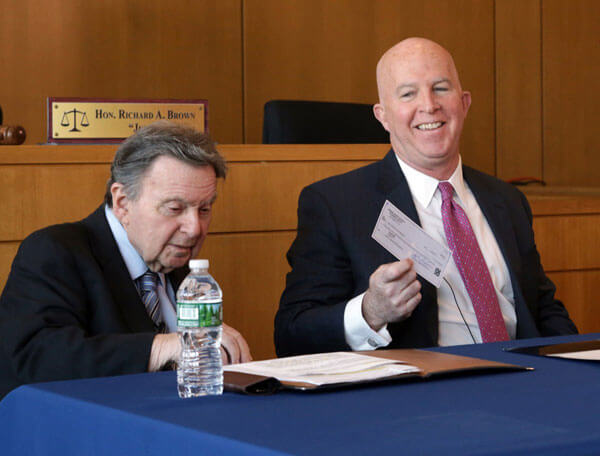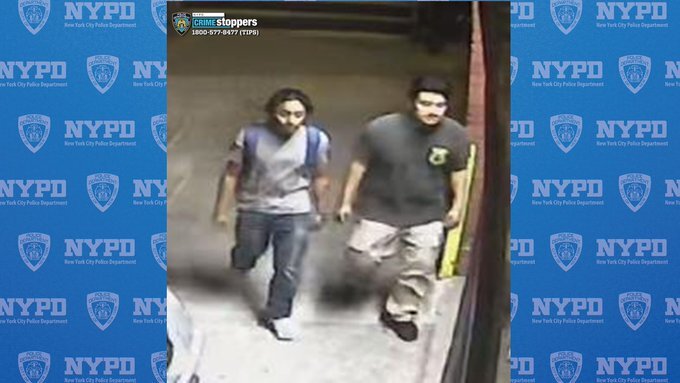By Gina Martinez
Queens District Attorney Richard Brown presented Police Commissioner James O’Neill a check for $20,391,864 Monday morning to fund neighborhood policing initiatives in Queens. The announcement was made at a press conference at the New York Police Academy in College Point, where Brown said the main use of the funds would be to enhance O’Neill’s community based police strategy in all 16 precincts in Queens.
“In essence, it heralds the return of a familiar figure – the cop on the beat who knows the people and the community he or she serves,” Brown said. “By forging closer, more meaningful relationships with local business owners, community advocates, religious leaders and residents, it is hoped that a line of dialogue can be opened up between the police and the communities that will result in mutual understanding and an easing of the tension and mistrust that often times exists between the police and many of the communities they protect.”
The $20,391,864 given to the NYPD is a portion of the money won in the 2012 HSBC Holdings agreement, the money laundering case the Queens district attorney’s office helped with. HSBC agreed to forfeit $1.256 billion as a part of a deferred prosecution agreement with the U.S. Department of Justice in addition to $665 million in civil penalties. The Queens DA’s office received an equitable sharing award of $116 million from the Department of Treasury’s program for its contributions to the investigation. According to the Treasury’s guidelines, equitable sharing funds must supplement existing resources and be used only for valid law enforcement purposes.
“I want to thank Judge Brown for his leadership and for supporting this police department with critically essential funding,” O’Neill said. “The $20 million Judge Brown has allocated for this department will be an important investment in neighborhood policing, our crime fighting strategy. This forfeiture funding will provide our cops with essential tools – like vehicles, technology, and training – they need to do their job. I thank him for this investment in us and helping us keep this city the safest big city in America.”
According to the DA, federal guidelines say that shared funds cannot be used to supplement the police department’s existing budget but to fund new initiatives from the NYPD. Brown explained the money will be used to purchase supplies for use by officers assigned to the new NYPD Neighborhood Policing model implemented in all Queens precincts. The initiative focuses on localized community-based policing that builds a relationship between community members and officers.
“Working in the same area every day and staying within the established sector,” Brown added, “these teams of officers will be enabled to become fully familiar with and address local conditions, engage with the community, better identify sector specific problems, conduct follow-ups, participate in community meetings and engage in collaborative problem-solving actions with sector residents and business owners.”
The model was first introduced in 2015 in select precincts throughout the city but will expand to all areas in Queens, the DA said. The initiative will assign a permanent two-officer team to specific neighborhood sectors in each precinct and on each shift, according to the DA. The sector partners will work with Neighborhood Coordination Officers, who have an idea of the existing problems in the area, in order to foster positive relationships with the community.
O’Neill gave a breakdown of where the funds would go: $11,291,214 will go towards 264 new vehicles to be used by officers in the 16 Queens precincts, $1,638,180 will go toward 19,000 upgraded gun holsters, and $1,587,500 will go toward new flashlights for officers who often have to purchase their own after graduation. The rest of the funds will also go toward new tablets, license plate readers and software upgrades, the commissioner said.
Reach Gina Martinez by e-mail at gmart


































